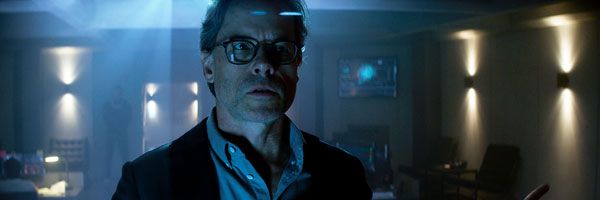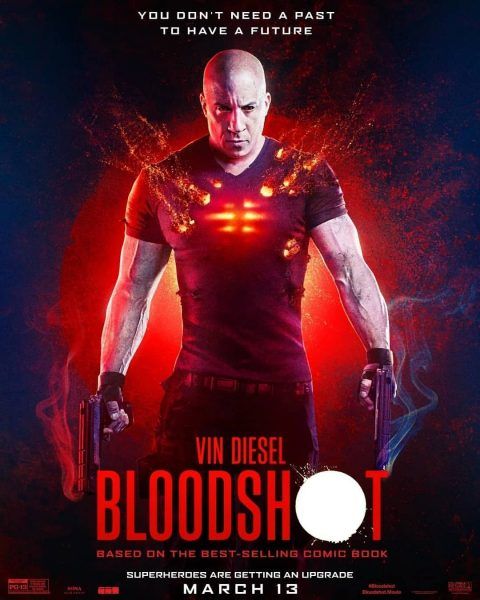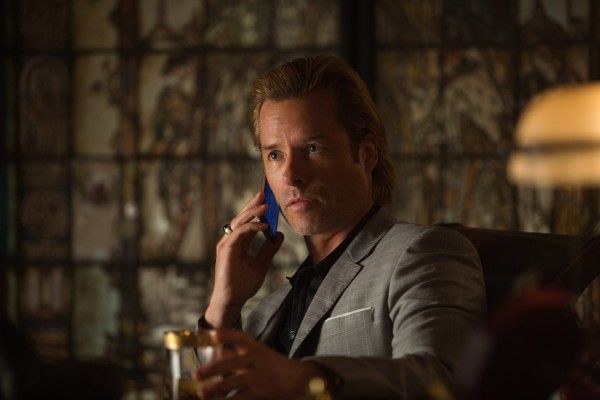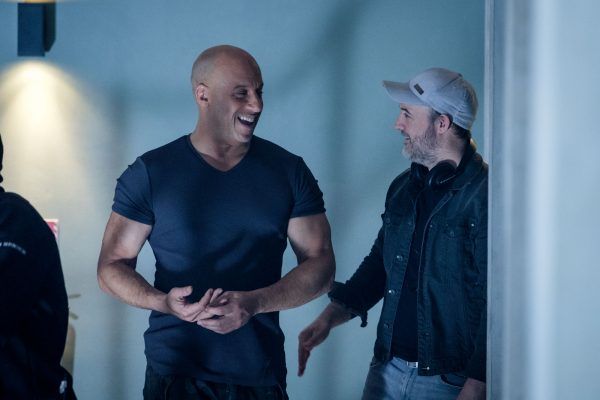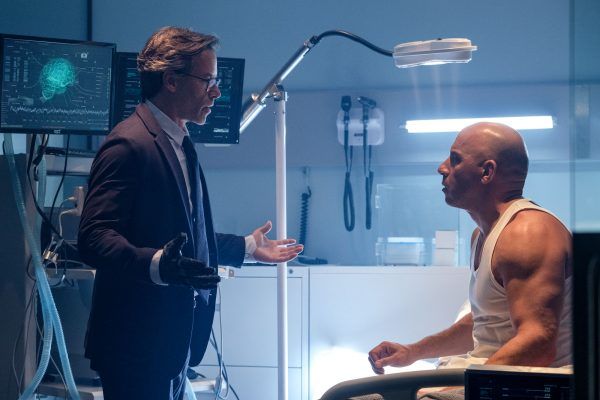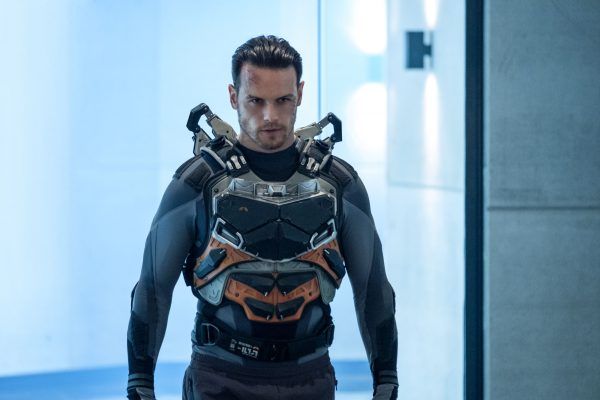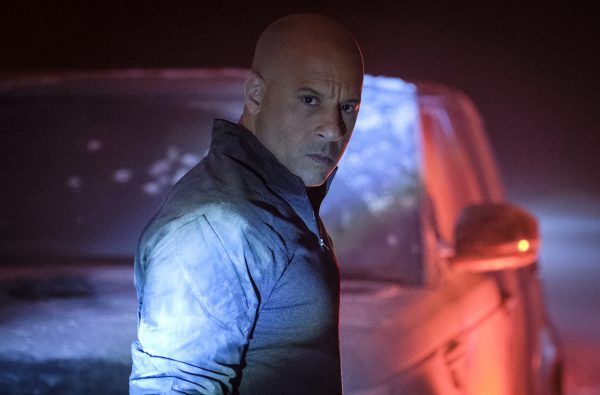Guy Pearce knows a thing or two about being part of franchise films, but with the industry so packed with superhero films and comicbook adaptations, a top priority for the folks working on the Valiant films has to be figuring out a way to make them stand out. Pearce is confident Bloodshot will put the potential film series on the right path in that respect right out the gate.
He plays Dr. Emil Harting in the film, the person leading the team over at Rising Spirit Technology. RST has helped a number of wounded soldiers recover from injuries and become stronger than ever - like KT (Eiza González), Dalton (Sam Heughan) and Tibbs (Alex Hernandez) - but Ray Garrison (Vin Diesel) is a different situation. Ray is killed and becomes the very first person that Harting brings back to life with nanotechnology.
With Bloodshot now in theaters nationwide, I got the chance to hop on the phone with Pearce to talk about what motivated him to take the role, whether his experience on Iron Man 3 came in handy here, the similarities between Bloodshot and Memento, his upcoming exorcism film Seventh Day, and loads more. You can read about it all for yourself in the interview below! And if you’re looking for even more Bloodshot talk, click here for my interview with director Dave Wilson.
I feel like it's been a little while since we've seen you in something along the lines of a big superhero movie or a franchise so what was it about Bloodshot that made you want to take the plunge again?
GUY PEARCE: Well, it's always the story. It's always the plot and whatever is being told and whether there's perhaps a fresh perspective on something. And I just found that the work that my character was doing in the film was really fascinating. And also then the relationship that develops that obviously becomes quite complex between Harting and Vin's character of Ray Garrison, but also the team of people that Harting has sort of working under him. So I just found the whole thing, it was just really interesting to me. I think the Valiant world is quite different from other worlds that we know so yeah, something about it really appealed.
Speaking of the Valiant world, we have an abundance of superhero and comic book adaptations out there right now so what do you think it is about their material that's going to make them stand out?
PEARCE: Well, it just feels a bit darker and feels a bit more real in a way even though the technology is, it's almost like science fiction. I think in this day and age where we're not so surprised anymore in the development in technology, this just feels like it taps into something that is really contemporary. And there's just a tone and a feel to it that doesn't have that same safe quality that I think other sort of superhero stories delve into. And on some level, I don't necessarily look at this as a superhero film but I can understand that once Ray Garrison has become the changed man that he has, then he certainly has superhero abilities and qualities.
Is there anything about your experience having worked on a film like Iron Man 3 that came in handy for you here?
PEARCE: Look, I don’t think so. I mean, not that I know of specifically. I think every film you do is a really different experience, and so much of it comes down to the people you're working with. And I'm obviously on films like Iron Man 3 and on The Time Machine, etc, there’s a lot of visual effects going on so I've had experience with that, but that doesn't necessarily play a part in my experience per se. Obviously I'm aware, particularly in talking to Dave Wilson our director who's very experienced with visual effects, it's just about gaining an understanding of what's going to end up up on the screen, if in fact it's not there on the day. But that's then just a matter of relying on one's imagination. And of course, you saw the film last night, I've seen it as well; it's really impressive.
It's quite a visual feast. So I think that's also a difference I guess in this film - this is really the first Valiant film as such - so I'll be interested to see how others appear and how they are presented, etc., but there's just something about the artistic look of this film that seems different to others and it's hard to necessarily pinpoint what that is. It's just like different artists and comparing their work.
Were you surprised they put a project of this size in the hands of a first time feature director? It’s quite the accomplishment for Dave!
PEARCE: It really is. I mean, on some level, nothing surprises me anymore because, I think if people have shown that they’re able to articulate what it is that they want and even though Dave I guess technically is a first time director, he's certainly worked in this field in a way before, so you've got a first time director and you've got a first time director. He's not a kid who's just sort of come out of film school and gone, ‘Okay, what am I doing?’ [Laughs] He's a mature and very articulate guy and has a really strong handle on things. So I'm sort of not surprised that they gave him this opportunity. I get that films like this are big and they're expensive and there's a lot at stake, etc., but I think Dave has a lovely, eloquent way of sort of presenting what it is he's hoping to do and good experience. So yeah, I'm sure he convinced them and they're probably only even more convinced now after looking at the work. So yeah, he was fantastic to work with.
Did you see his experience in the visual effects department coming through in a unique way for him as an actor's director?
PEARCE: Well, only in that he was able to explain things. And he's a really humane guy. He's very communicative and it's not like he's a techie nerd who - and not to suggest techie nerds aren't humane - but it's not that he's so caught up in the visual effects that he can't even talk to the actors on set and just tell you to sort of stand somewhere and stuff's gonna happen around you. He was very communicative about the journey of every character, the emotional state of every character. In a way, really he was just a fairly standard, good director but he just happens to have this wealth of visual effects knowledge that he can also bring to the conversation.
Going back to the sci-fi nature of the film; is there anything about what's going on in Bloodshot that you think could soon be a reality?
PEARCE: Well, I think so. I mean, you can go down an internet rabbit hole and find all sorts of developments that are occurring in various labs around the world and scientific houses around the world where artificial intelligence and robotics are really much further down the line than you might expect. So I kind of look at that and go, ‘Wow, anything's possible pretty quickly.’ [Laughs] Talking about being surprised, that stuff surprises me. I find just the advancement in medical sort of technology and ability these days is just utterly astounding. But what they're able to do with robotics and combining sort of human and robotics is such a bizarre but inevitable kind of development.
I've gone down that rabbit hole quite a bit.
PEARCE: Have you?
It's fascinating stuff!
PEARCE: And scary in a way! You kind of go, ‘Wow, is that what's happening to us?’
It's the push-pull between the scary and the necessary because there's so much good being done in that sector also.
PEARCE: Sure, but I guess like anything, things can kind of get out of hand. And of course, the biggest fear that we all have I suppose in this regard is that eventually the robots that we create turn against us [laughs], because we've made them so clever and so three dimensional. I think there's an underlying kind of feeling that still exists. It certainly is in me. [Laughs]
Hopefully we're all prepped by the cautionary tales we've seen on the big screen!
PEARCE: That's right! [Laughs]
Do you have to find the humanity in a character like Harting?
PEARCE: Well, yes, the humanity but also sort of the needs and the necessities and what's driving him and the pressure that he may be under when you're dealing with sort of big corporation and you're dealing with big companies, etc. That's sort of a world that I, funnily enough, don't really know anything about, but I certainly understand that there can be great pressure out there and sort of companies within companies that are just bigger and bigger and bigger. Trying to get a sense of that and for somebody like Harting who I guess is a bit of a genius in a way, trying to sort of juggle the development of his technology with ethics and morals is always fun stuff to play. And as you've seen the film, so you sort of see what direction things sort of go in.
But yeah, I think for me as an actor, I'm always looking to find just those really emotional human things. Like what's a character’s insecurity? What are they confident about? Where are they putting blinkers up? What are they open about? What are they closed off about, etc. And there are things that you can have sort of general conversations with your director etc., but quite often those things just kind of come to the surface and I end up playing them and I'm not across all of them necessarily, but they just sort of occur based on feelings that I have when I read something and I work on it more. You really get a sense that, ‘Oh, maybe this character’s really quite anxious about - maybe he's quite socially anxious.’ That's a result of the genius versus the pressure he's under etc., etc. So all that sort of stuff comes into play in order to make a character just feel real, like a real human being.
Did you find yourself thinking about Memento much at all while working on this?
PEARCE: Well, I did. Yeah, I did. I mean, absolutely. I can see the connection between the two. On many levels Memento can pop into my head - I mean, not on many levels - but sometimes Memento can pop into my head anyway because characters are often dealing with memory and how they describe an experience they've had. And of course memory can be a questionable subject anyway. But the idea of sort of constructing memories for somebody, which, you know, we also do for us when we look at an old photo and we sort of construct the world that occurred around that photo, but we’re probably wrong about a lot of it. So yes, there was a point on the film where I went, ‘This is sort of like a weird, futuristic, high tech, kind of sci-fi version of Memento in a way.’ [Laughs]
Vin is such a force in the industry so I'm curious, what was the most surprising thing about working with Vin Diesel for you?
PEARCE: I don't know. What was so surprising? I mean, he was so delightful with me and he had his family there with him. He really was just a sort of delightful family man. And clearly he's a giant movie star, so for him to sort of juggle those two things I think was really admirable. And there was a big team of people there with him and looking after his kids and with his family, etc. So there's a whole sort of industry that goes along with these guys that are super, super famous. But yeah, he was funny and fun and yeah, just really interested and came to sort of dig into the material and make it as philosophical and as interesting as possible really. So yeah, he was delightful. We both realized we were exactly the same age, so we connected over that. He looks a little fitter and younger than me though. [Laughs]
He's on a completely different level from everybody out there in that respect! Before I lose you, I went to school with the director of Seventh Day so have to ask you about that. What is it about that story that makes it stand out from other exorcism films we've seen?
PEARCE: Well, I mean they've touted it as kind of Training Day meets The Exorcist so there's a lovely story going on of an older exorcist training up a young priest. And Justin [Lang], as you obviously know, is a very clever guy and I thought his film The Dark was really quite sort of strange and has an interesting quality to it. And this script was great, too. So I just went, ‘Oh yeah, this is fascinating’" And I've never really delved into this world before as far as film styles. So yeah, jumped on board.
After that, is it The Portable Door for you?
PEARCE: Yeah, that’s sort of I'm down as being attached to that, but they still need to sort of raise all their money and find out where that's going. I've got another film coming out called The Last Vermeer.

